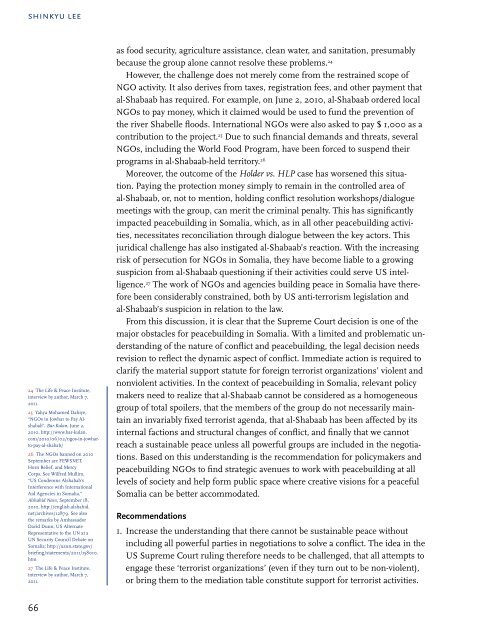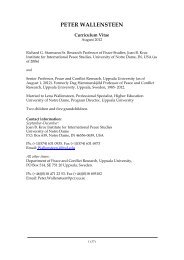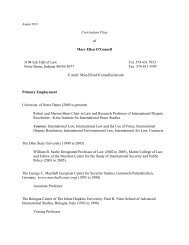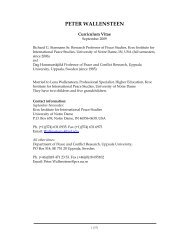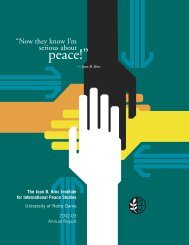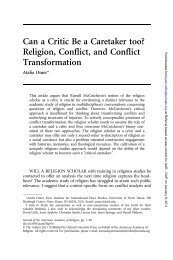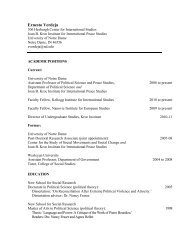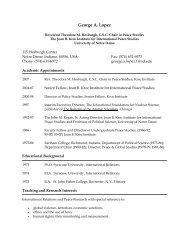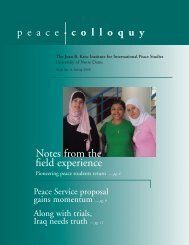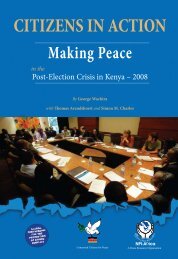Somalia: Creating Space for Fresh Approaches to Peacebuilding
Somalia: Creating Space for Fresh Approaches to Peacebuilding
Somalia: Creating Space for Fresh Approaches to Peacebuilding
Create successful ePaper yourself
Turn your PDF publications into a flip-book with our unique Google optimized e-Paper software.
shinkyu lee<br />
24 The Life & Peace Institute,<br />
interview by author, March 7,<br />
2011.<br />
25 Yahya Mohamed Dahiye,<br />
“NGOs in Jowhar <strong>to</strong> Pay Alshabab”,<br />
Bar-Kulan, June 2,<br />
2010, http://www.bar-kulan.<br />
com/2010/06/02/ngos-in-jowhar<strong>to</strong>-pay-al-shabab/<br />
26 The NGOs banned on 2010<br />
September are FEWSNET,<br />
Horn Relief, and Mercy<br />
Corps. See Wilfred Mulliro,<br />
“US Condemns Alshabab’s<br />
Interference with International<br />
Aid Agencies in <strong>Somalia</strong>,”<br />
Alshahid News, September 18,<br />
2010, http://english.alshahid.<br />
net/archives/12879. See also<br />
the remarks by Ambassador<br />
David Dunn, US Alternate<br />
Representative <strong>to</strong> the UN at a<br />
UN Security Council Debate on<br />
<strong>Somalia</strong>: http://usun.state.gov/<br />
briefing/statements/2011/158010.<br />
htm<br />
27 The Life & Peace Institute,<br />
interview by author, March 7,<br />
2011.<br />
66<br />
as food security, agriculture assistance, clean water, and sanitation, presumably<br />
because the group alone cannot resolve these problems. 24<br />
However, the challenge does not merely come from the restrained scope of<br />
NGO activity. It also derives from taxes, registration fees, and other payment that<br />
al-Shabaab has required. For example, on June 2, 2010, al-Shabaab ordered local<br />
NGOs <strong>to</strong> pay money, which it claimed would be used <strong>to</strong> fund the prevention of<br />
the river Shabelle floods. International NGOs were also asked <strong>to</strong> pay $ 1,000 as a<br />
contribution <strong>to</strong> the project. 25 Due <strong>to</strong> such financial demands and threats, several<br />
NGOs, including the World Food Program, have been <strong>for</strong>ced <strong>to</strong> suspend their<br />
programs in al-Shabaab-held terri<strong>to</strong>ry. 26<br />
Moreover, the outcome of the Holder vs. HLP case has worsened this situation.<br />
Paying the protection money simply <strong>to</strong> remain in the controlled area of<br />
al-Shabaab, or, not <strong>to</strong> mention, holding conflict resolution workshops/dialogue<br />
meetings with the group, can merit the criminal penalty. This has significantly<br />
impacted peacebuilding in <strong>Somalia</strong>, which, as in all other peacebuilding activities,<br />
necessitates reconciliation through dialogue between the key ac<strong>to</strong>rs. This<br />
juridical challenge has also instigated al-Shabaab’s reaction. With the increasing<br />
risk of persecution <strong>for</strong> NGOs in <strong>Somalia</strong>, they have become liable <strong>to</strong> a growing<br />
suspicion from al-Shabaab questioning if their activities could serve US intelligence.<br />
27 The work of NGOs and agencies building peace in <strong>Somalia</strong> have there<strong>for</strong>e<br />
been considerably constrained, both by US anti-terrorism legislation and<br />
al-Shabaab’s suspicion in relation <strong>to</strong> the law.<br />
From this discussion, it is clear that the Supreme Court decision is one of the<br />
major obstacles <strong>for</strong> peacebuilding in <strong>Somalia</strong>. With a limited and problematic understanding<br />
of the nature of conflict and peacebuilding, the legal decision needs<br />
revision <strong>to</strong> reflect the dynamic aspect of conflict. Immediate action is required <strong>to</strong><br />
clarify the material support statute <strong>for</strong> <strong>for</strong>eign terrorist organizations’ violent and<br />
nonviolent activities. In the context of peacebuilding in <strong>Somalia</strong>, relevant policy<br />
makers need <strong>to</strong> realize that al-Shabaab cannot be considered as a homogeneous<br />
group of <strong>to</strong>tal spoilers, that the members of the group do not necessarily maintain<br />
an invariably fixed terrorist agenda, that al-Shabaab has been affected by its<br />
internal factions and structural changes of conflict, and finally that we cannot<br />
reach a sustainable peace unless all powerful groups are included in the negotiations.<br />
Based on this understanding is the recommendation <strong>for</strong> policymakers and<br />
peacebuilding NGOs <strong>to</strong> find strategic avenues <strong>to</strong> work with peacebuilding at all<br />
levels of society and help <strong>for</strong>m public space where creative visions <strong>for</strong> a peaceful<br />
<strong>Somalia</strong> can be better accommodated.<br />
Recommendations<br />
1. Increase the understanding that there cannot be sustainable peace without<br />
including all powerful parties in negotiations <strong>to</strong> solve a conflict. The idea in the<br />
US Supreme Court ruling there<strong>for</strong>e needs <strong>to</strong> be challenged, that all attempts <strong>to</strong><br />
engage these ‘terrorist organizations’ (even if they turn out <strong>to</strong> be non-violent),<br />
or bring them <strong>to</strong> the mediation table constitute support <strong>for</strong> terrorist activities.


